Kings College London (KCL)
Meest recente samenvattingen op de Kings College London (KCL). Op zoek naar een samenvatting op de Kings College London (KCL)? Wij hebben diverse samenvattingen voor jouw school of universiteit.
-
673
-
28
-
52
Studies op de Kings College London (KCL)
Er zijn samenvattingen beschikbaar voor de volgende opleidingen op Kings College London (KCL)
-
A-level 1
-
BA Geography 1
-
Biochemistry 4
-
Biology 1
-
Biomedical science 1
-
Biomedical/Medicine 5
-
BSc Biomedical Sciences 19
-
BSc Business Management 1
-
BSc Psychology 8
-
Business 1
-
Dentistry/ Medicine undegraduate 1
-
English Literature 1
-
French with English 1
-
International Management 20
-
International Relations 1
-
Kings College London 168
-
Law LLB 26
-
Politics, Philosophy and Law 2
-
Software Development 2
Populaire samengevatte boeken Kings College London (KCL)
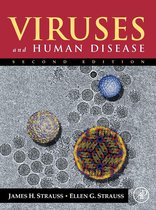
Ellen G. Strauss, James H. Strauss • ISBN 9780123737410

A P Simester, John Spencer • ISBN 9781849467223

Caramani • ISBN 9780199574971

Andrew Dessler, Andrew E. Dessler • ISBN 9781107480674

Sir Jack Beatson, Hon. Andrew Burrows • ISBN 9780198734789
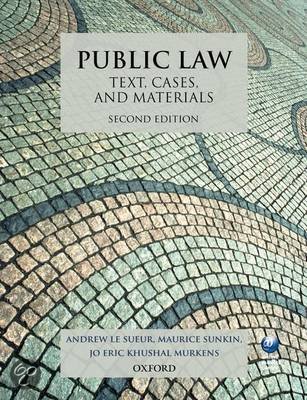
Andrew Le Sueur, Maurice Sunkin • ISBN 9780199644186
Nieuwste samenvattingen Kings College London (KCL)

This essay focuses on the contents of Uncovering the cancer genome. There may also be some additional readings. Cancer is a common complex disease, caused by a mix of the environment and genetics. Hereditary cancers are rare types of cancers that account for 5 to 10% of all cancer cases. Examples include the autosomal dominant Lynch syndrome which is associates with an increased risk of colorectal cancer and the autosomal recessive Fanconi Anaemia which increases the risk of leukaemia. Sporadic ...
- Essay
- • 3 pagina's's •
-
Kings College London•Cancer genetics
Voorbeeld 1 van de 3 pagina's
This essay focuses on the contents of Uncovering the cancer genome. There may also be some additional readings. Cancer is a common complex disease, caused by a mix of the environment and genetics. Hereditary cancers are rare types of cancers that account for 5 to 10% of all cancer cases. Examples include the autosomal dominant Lynch syndrome which is associates with an increased risk of colorectal cancer and the autosomal recessive Fanconi Anaemia which increases the risk of leukaemia. Sporadic ...
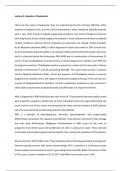
This essay focuses on the contents of Genetics of leukaemia. There are four types of leukaemia, they are characterised by the cell type affected, either myeloid or lymphoid cells, and the clinical presentation, acute leukaemia typically presents with a very short history of rapidly progressing symptoms and chronic leukaemia presents with long history of very slowly progressive symptoms. Acute leukaemia are often considered curable conditions whereas chronic leukaemia are generally not, though re...
- Essay
- • 3 pagina's's •
-
Kings College London•Cancer genetics
Voorbeeld 1 van de 3 pagina's
This essay focuses on the contents of Genetics of leukaemia. There are four types of leukaemia, they are characterised by the cell type affected, either myeloid or lymphoid cells, and the clinical presentation, acute leukaemia typically presents with a very short history of rapidly progressing symptoms and chronic leukaemia presents with long history of very slowly progressive symptoms. Acute leukaemia are often considered curable conditions whereas chronic leukaemia are generally not, though re...
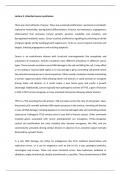
This essay focuses on the inherited cancer syndromes. Some examples include Lynch syndrome, familial adenomatous polyposis (FAP), BRCA1/2 related disease, multiple endocrine neoplasia and Li-Fraumeni syndrome. Lynch syndrome is caused by impaired DNA repair, FAP is caused by a faulty TSG, BRCA1/2 related disease is caused by impaired double stranded break repair and Li-Fraumeni syndrome is associated with TP53 defects.
- Essay
- • 3 pagina's's •
-
Kings College London•Cancer genetics
Voorbeeld 1 van de 3 pagina's
This essay focuses on the inherited cancer syndromes. Some examples include Lynch syndrome, familial adenomatous polyposis (FAP), BRCA1/2 related disease, multiple endocrine neoplasia and Li-Fraumeni syndrome. Lynch syndrome is caused by impaired DNA repair, FAP is caused by a faulty TSG, BRCA1/2 related disease is caused by impaired double stranded break repair and Li-Fraumeni syndrome is associated with TP53 defects.
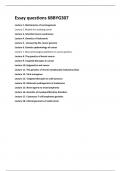
Lecture one focuses on the Mechanisms of carcinogenesis. The lifetime risk for any individual to develop cancer is 50%. 38% of these cases are preventable, including melanoma, lung cancer and breast cancer. 15% of cancer cases are related to smoking and 3%-10% are related to obesity. Predisposing factors to cancer include toxins, inflammation and immunity, genetic mutations, hormones and ethnicity. Risk factors include occupation, family and medical history, age, gender, ethnicity, genes, immuni...
- Essay
- • 5 pagina's's •
-
Kings College London•Cancer genetics
Voorbeeld 2 van de 5 pagina's
Lecture one focuses on the Mechanisms of carcinogenesis. The lifetime risk for any individual to develop cancer is 50%. 38% of these cases are preventable, including melanoma, lung cancer and breast cancer. 15% of cancer cases are related to smoking and 3%-10% are related to obesity. Predisposing factors to cancer include toxins, inflammation and immunity, genetic mutations, hormones and ethnicity. Risk factors include occupation, family and medical history, age, gender, ethnicity, genes, immuni...

These essays cover in depth lecture 3 in Immunology of Human Disease. The two questions allow to organise and structure your response for your exam. These questions are: Explain the principle of antibody diversification which occurs for vaccination to be effective; and Explain the principles of vaccination, elucidating the mechanisms through which vaccines induce adaptive immune responses. Discuss the role of B cells, antibodies, and T cells in mounting an effective immune response upon vaccinat...
- College aantekeningen
- • 4 pagina's's •
-
Kings College London•Immunology of Human Disease
Voorbeeld 1 van de 4 pagina's
These essays cover in depth lecture 3 in Immunology of Human Disease. The two questions allow to organise and structure your response for your exam. These questions are: Explain the principle of antibody diversification which occurs for vaccination to be effective; and Explain the principles of vaccination, elucidating the mechanisms through which vaccines induce adaptive immune responses. Discuss the role of B cells, antibodies, and T cells in mounting an effective immune response upon vaccinat...

This essay covers all the lecture content of lecture 8 of Immunology of Human Disease. It focuses on two main aspects: the intrinsic, innate and adaptive immune barriers to viral infection; and pattern recognition. To maintain health, the immune system and body defences are coordinated to block a majority of infections. Pattern recognition involves the recognition pathogen associated molecular patterns by PRRs upon virus infection of host cells.
- Voordeelbundel
- College aantekeningen
- • 4 pagina's's •
-
Kings College London•Immunology of Human Disease
-
8 lectures on Immunology of Human Disease - 6BBBI608• Doorines5
Voorbeeld 1 van de 4 pagina's
This essay covers all the lecture content of lecture 8 of Immunology of Human Disease. It focuses on two main aspects: the intrinsic, innate and adaptive immune barriers to viral infection; and pattern recognition. To maintain health, the immune system and body defences are coordinated to block a majority of infections. Pattern recognition involves the recognition pathogen associated molecular patterns by PRRs upon virus infection of host cells.

This essay covers all the content of lecture 7 of Immunology of Human Disease. The essay question is: Discuss the fundamental hallmarks of cancer, elucidate the challenges presented by the tumour microenvironment in relation to immune responses, and delineate the prerequisites for an efficient T cell-mediated immune response.
- Voordeelbundel
- College aantekeningen
- • 4 pagina's's •
-
Kings College London•Immunology of Human Disease
-
8 lectures on Immunology of Human Disease - 6BBBI608• Doorines5
Voorbeeld 1 van de 4 pagina's
This essay covers all the content of lecture 7 of Immunology of Human Disease. The essay question is: Discuss the fundamental hallmarks of cancer, elucidate the challenges presented by the tumour microenvironment in relation to immune responses, and delineate the prerequisites for an efficient T cell-mediated immune response.

These essays cover all the content of lecture 6 in Immunology of Human Disease. The first question delves into he immuno-pathogenesis of psoriasis and atopic dermatitis, highlighting their key immunological differences. There are 4 subquestions focusing on different aspects of the diseases. The second question delves into analysing the current challenges in the treatment of inflammatory skin diseases, discussing the limitations and advancements in therapeutic approaches.
- Voordeelbundel
- College aantekeningen
- • 5 pagina's's •
-
Kings College London•Immunology of Human Disease
-
8 lectures on Immunology of Human Disease - 6BBBI608• Doorines5
Voorbeeld 2 van de 5 pagina's
These essays cover all the content of lecture 6 in Immunology of Human Disease. The first question delves into he immuno-pathogenesis of psoriasis and atopic dermatitis, highlighting their key immunological differences. There are 4 subquestions focusing on different aspects of the diseases. The second question delves into analysing the current challenges in the treatment of inflammatory skin diseases, discussing the limitations and advancements in therapeutic approaches.
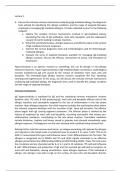
This essay covers all the content of lecture 5 of Immunology of Human Disease. It discusses Allergy and Asthma. The question is: Discuss the intricate immune mechanisms underlying IgE-mediated allergy, the diagnostic tests utilized for identifying this allergic condition, and the range of targeted therapies employed in managing IgE-mediated allergies.
- Voordeelbundel
- College aantekeningen
- • 3 pagina's's •
-
Kings College London•Immunology of Human Disease
-
8 lectures on Immunology of Human Disease - 6BBBI608• Doorines5
Voorbeeld 1 van de 3 pagina's
This essay covers all the content of lecture 5 of Immunology of Human Disease. It discusses Allergy and Asthma. The question is: Discuss the intricate immune mechanisms underlying IgE-mediated allergy, the diagnostic tests utilized for identifying this allergic condition, and the range of targeted therapies employed in managing IgE-mediated allergies.
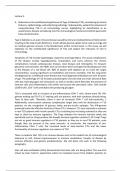
These essays cover all the lecture content of lecture 4 of 6BBBI608. It discusses the pathogenesis of Type 1 Diabetes (T1D). The first question is: Elaborate on the multifaceted significance of Type 1 Diabetes (T1D), considering its clinical features, epidemiology, and underlying pathology. Subsequently, explain the relevance of comprehending T1D in an Immunology course, highlighting its classification as an autoimmune disease and delving into the immunological mechanisms behind pancreatic bet...
- Voordeelbundel
- College aantekeningen
- • 4 pagina's's •
-
Kings College London•Immunology of Human Disease
-
8 lectures on Immunology of Human Disease - 6BBBI608• Doorines5
Voorbeeld 1 van de 4 pagina's
These essays cover all the lecture content of lecture 4 of 6BBBI608. It discusses the pathogenesis of Type 1 Diabetes (T1D). The first question is: Elaborate on the multifaceted significance of Type 1 Diabetes (T1D), considering its clinical features, epidemiology, and underlying pathology. Subsequently, explain the relevance of comprehending T1D in an Immunology course, highlighting its classification as an autoimmune disease and delving into the immunological mechanisms behind pancreatic bet...
